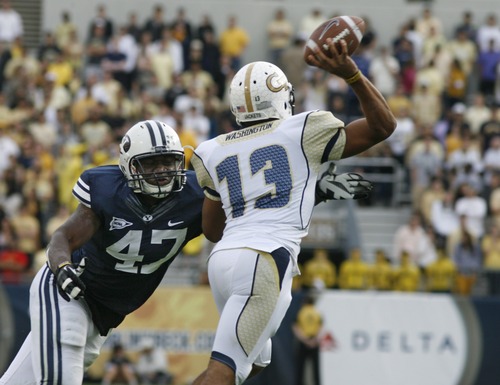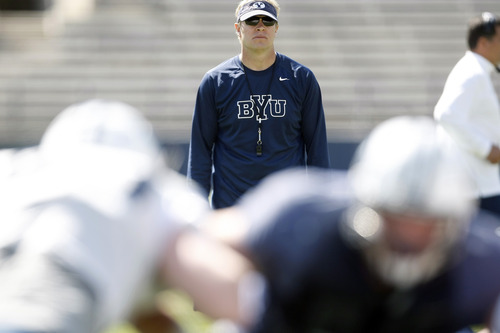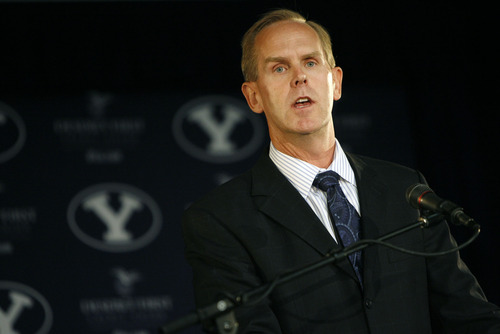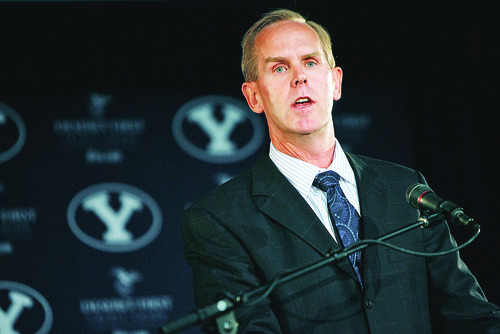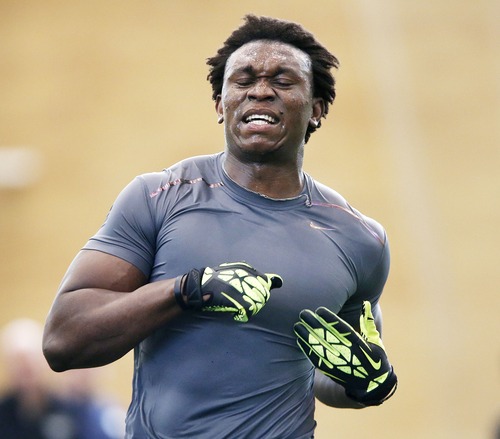This is an archived article that was published on sltrib.com in 2013, and information in the article may be outdated. It is provided only for personal research purposes and may not be reprinted.
Provo • There have been the expected headaches over football scheduling. Ask anyone who endured 20-degree temperatures and an 8:15 p.m. kickoff to watch BYU blast Idaho 52-13 last November.
There have been appearances in less lucrative bowl games, and some basketball games in venues so small they resemble high school gymnasiums.
But BYU athletic director Tom Holmoe last week said without hesitation that, knowing what he knows now, he would do it all over again. Almost three years since BYU announced it was going independent in football and moving most of its other sports teams to the West Coast Conference, the school's coaches and athletic administrators continue to trumpet the bold move as an unequivocal success.
"For sure, I would do it again," Holmoe said. "It has given us new energy and additional opportunities. We were in a good spot before, but I believe we are better off now."
Officially, BYU left the Mountain West Conference on July 1, 2011, after announcing its plans on Sept. 1, 2010. It has played two seasons of football as an independent, going 18-8 and winning two lower-tier bowl games while playing the somewhat soft schedule, especially in latter halves of the seasons, that Holmoe and school president Cecil Samuelson warned fans about in 2010.
"There will be some growing pains. ... It won't be a perfect scenario right off the bat," Holmoe said in 2010.
—
Exposure equals success • The athletic director said success has come because of BYU's "broadcast partnership" with ESPN to get almost all of its football games televised on one of the TV sports giant's platforms — for which the school gets an estimated $8 million to $10 million a year — and because of BYUtv. The school-owned television station broadcasts at least one home football game a year, and hundreds of other BYU athletic events and productions. It is available to more than 50 million cable and satellite subscribers in the United States and abroad.
"Our [agreements] with ESPN and BYUtv are very unique," Holmoe said. "They provide us the exposure and fan access that are important to us as an institution."
Football coach Bronco Mendenhall said the increased exposure has opened new avenues for recruiting. Last week he said BYU's summer football camps probably draw more participants from more states than any school in the country because of that exposure.
"Our ESPN exposure, I knew it would be good. I didn't anticipate it would be this good," Mendenhall said. "I mean, there are only eight teams that have been seen more. Man, when you consider all the teams that play in all the markets and all the conferences, that is a powerful number. And then when you add BYUtv to it, the exposure component and the access component have exceeded my expectations. … So now that the scheduling part is making significant progress, there is not much downside that I am seeing right now."
—
Still relevant? • Critics of the move said BYU would lose some of its relevance nationally by not having a conference championship to play for in football and by going to a conference not as highly respected (in basketball, at least) as the MWC. Whether that has happened is difficult, if not impossible, to quantify. But several national college sports experts, such as Dennis Dodd of CBSsports.com, who attended BYU's recent Football Media Day, have continued to give the school and its athletes plenty of publicity.
That defensive end Ziggy Ansah was selected No. 5 overall by the Detroit Lions in April's NFL Draft, breaking a two-year drought for BYU, showed the program is still relevant and respected in the pro ranks, Mendenhall said.
Still, other observers locally and nationally remain skeptical.
"No additions or subtractions are planned, but the Mountain West undoubtedly is keeping its eye on BYU's ongoing independent football experiment," wrote Pat Forde of Yahoo! Sports. "If the Cougars ever pull the plug on it, the league surely would love to have back one of its former flagship schools."
—
Scheduling highs and lows • Mendenhall was about to enter his sixth year at the football helm when the announcement was made. He said at the time he fully supported the move. He remains steadfast in that belief now and obviously is happy, having recently signed a three-year contract extension.
"The scheduling was my biggest concern [about independence] late in the season," he said. "Having a hard time finding those games, or people willing to play, is being resolved over time. And I wasn't sure how long that would take."
The Cougars will play at Wisconsin, at Notre Dame and at Nevada this November, sandwiched around a home game against Idaho State of the Big Sky Conference. In November 2014, they are scheduled to host Southern Mississippi and UNLV in November and play at Middle Tennessee State in that month.
"We just followed the plan," Holmoe said. "We knew what we wanted, and we went for it. And the first couple of years, I think our fans stayed patient with us. And now that the tough schedule is here, we got to play. And that puts pressure on a lot of the team, and the coaches. But this is athletics, and our fans want us to be playing in the big games, on the road and at home. They are easier to get on the road. They are great when you get them at home."
—
Another downside? • If there is another downside to football independence, it could manifest itself if the Cougars put together an undefeated, or one-loss season, and are left out of the four-team College Football Playoff. Most national observers agree that independents Army and BYU will have the most difficult path to the CFP, which begins in 2014.
"It just depends on how good you are," Holmoe said. "And if we are really good, we will get in. If we are pretty good, like maybe two losses, we won't. Whereas if you are in a Big Five conference, you have the better chance. I am comfortable with that right now. … If we are good enough to go above those conferences, we are in. And that's how it has been. I don't really see it any different."
Said Mendenhall, when asked about BYU's limited access to the BCS, and now the CFP: "Got to be undefeated, which is the same access that we had in the Mountain West. … We won't be able to win a conference championship game, but I think it is possible. And I like to focus more on what we can do and what we think is possible, rather than what we won't get. That's one of the main reasons I chose to stay, is because I think we can do it. When, I don't know. But our access in eight years I've been the coach, I don't think it has changed."
There are rumblings that a split might be coming to major college football, and Holmoe recently acknowledged the topic was broached, if only briefly, at an athletic directors summit a few months ago.
"Right now, independence works for us. It is good," Holmoe said. "But in the event that there is a split in college football, we have to be with the ones, with the big boys. Right now, as an independent, we are not in [a power conference]. So we are going to do everything that we can to position ourselves for the time when that happens, or if that happens. And that's important to us, because BYU football is a big part of college football."
—
Loving, but not dominating, the WCC • Some folks thought BYU would dominate the WCC, which grew to 10 schools earlier this week with the addition of Pacific.
Hasn't happened.
Sure, the Cougars won the 2012-13 WCC Commissioner's Cup, awarded to the school with the most success during conference play, after finishing second to the University of San Diego after their inaugural year in the league. But BYU isn't piling up as many league titles as it did in the MWC.
The Cougars have finished third twice in the regular season in men's basketball, and have struggled in the conference tournament.
"I like our relationship with the WCC," Holmoe said. "My assessment is that the top teams in every sport are really good. If you look at every sport, the top team in that sport [in the WCC] is probably in the top 10 [in the country]. Now, the depth doesn't go all the way down, but it is hard to win championships in the West Coast Conference, because some team, whether it is Gonzaga in basketball or Portland in women's soccer, or USF in cross-country, and you could go through them all, there is always a really, really tough foe in every sport.
"In the future, the conference will be even better," he continued. "It is an emerging conference. … The RPI in all the sports continues to increase. I think we got there at a great time."
—
Most fans support move • What do the folks who pay the freight — BYU's fans across the country — think of the move? Most seem to like it — especially those who don't reside in the state of Utah and have had the opportunity to see the Cougars play, live or on television, more than ever before.
"As a fan, I am happy with our independence and WCC status," said Jeff Bauserman of Abingdon, Va. "It is head-and-shoulders above being in the MWC. Given our options at the time, I think it was absolutely the best move possible. Having said that, I would be even happier if we were in the Big 12 or Pac-12."
Scott Wallace of Pendleton, Ore., wrote: "I like it a lot. My question is why we didn't do it sooner."
However, Dave Housley of San Antonio is in the minority.
"Texas Cougar fan here," he wrote. "While it is nice to see them come to the area, no conference affiliation creates too many exhibition-type games — games without meaning and no rivalries with conference foes any more. Conference titles mean something."
Holmoe has heard from a lot of them, via Twitter or email, mostly.
"There are a fair number of fans who don't like us being independent," he said. "And I think there are a fair number of fans that like us being independent. And there are a large number of fans that follow BYU no matter what." —
BYU's recent athletic milestones
Sept. 1, 2010 • BYU president Cecil Samuelson and athletic director Tom Holmoe announce Cougars will go independent in football and place most of their other sports in the West Coast Conference.
July 1, 2011 • BYU officially becomes a member of the WCC.
Dec. 30, 2011 • BYU completes its first season of football independence with a 24-21 win over Tulsa in the Armed Forces Bowl, giving the Cougars a 10-3 record.
March 15, 2012 • BYU's first basketball season in the WCC ends with an 88-68 loss to Marquette in the second round of the NCAA Tournament.
Nov. 23, 2012 • BYU's women's soccer team wins the WCC title and makes it to the NCAA quarterfinals before falling 2-1 in overtime to eventual champion North Carolina.
Dec. 20, 2012 • BYU defeats former MWC rival San Diego State 23-6 in the Poinsettia Bowl to finish its second season of independence with an 8-5 record.
April 2, 2013 • After its second consecutive third-place finish in the WCC, BYU's basketball team loses to Baylor 76-70 in the NIT basketball semifinals.


